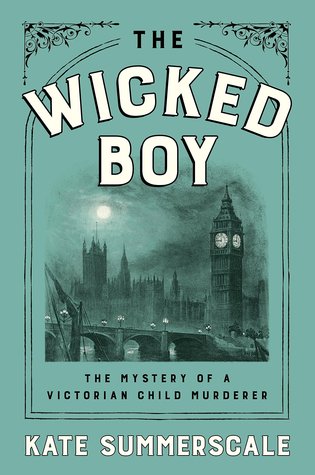 It’s July 1895, and brothers Robert and Nattie Coombes are having the perfect summer. With their father away earning a paycheck and their mother visiting relatives in Liverpool, the boys take all their meals at coffee houses, visit the seaside and theatre, and attend local day-long cricket matches.
It’s July 1895, and brothers Robert and Nattie Coombes are having the perfect summer. With their father away earning a paycheck and their mother visiting relatives in Liverpool, the boys take all their meals at coffee houses, visit the seaside and theatre, and attend local day-long cricket matches.
When their aunt — suspicious that the boys’ mother hasn’t written or returned — forces her way into the home, she discovers something horrifying: the decomposing body of Emily Coombes.
13 year-old Robert confesses to stabbing his mother, and expresses no remorse. The court hears testimony about his debilitating headaches and mood swings, as well as his obsession with “penny dreadfuls” and their glorified violence.
This testimony, plus the lack of any known motive, leads the jury to declare Robert Coombes insane. He becomes one of the youngest ever inmates of Broadmoor, the most infamous criminal lunatic asylum in history.
The Victorian era was the epicenter of titanic shifts in the way society thought about criminality and criminals, education, and the effects of pulp fiction on the human brain. The Wicked Boy: The Mystery of a Victorian Child Murderer focuses on these shifts — as well as the astonishing life of Robert Coombes.
“The Plaistow Horror”
I am obsessed with this book. I finished it weeks ago, but have been avoiding writing a review because I can’t figure out where to start.
The first few chapters were unsettling. The boys seem like callous freaks. Who murders their mother and then spends a week going out on the town while her body decomposes in an upstairs bedroom?
No one really knew what to believe. Both the defense and the prosecution informed the jury that Robert’s headaches, behavior problems, and collection of gory literature were the result of a twisted brain. His defense team believed he was insane; the prosecution believed he was a monster.
In the end, not even the hanging-happy English society was comfortable with sentencing a 13 year-old to death. Robert was declared insane, a danger to those around him, and sent to Broadmoor.
At Broadmoor and beyond
Fortunately for Robert, Broadmoor was a different kind of asylum. There were no straitjackets, no horrifying “therapies.” Just routine, a quiet country setting, and capable staff.
Robert went on to become a champion chess player, worked in the onsite tailor’s shop, and was a member of Broadmoor’s brass band.
17 years after he was committed, Robert was discharged. He traveled to Australia, joined the military at the beginning of World War I, and became a fucking war hero.
In 1930, Robert took saved his neighbor’s son Harry from an abusive stepfather, and essentially raised him as his own. He died in 1949, and is buried in Australia.
Mind. Blown.
So what happened? How did a 13 year-old who stabbed and bludgeoned his mother to death go on to live a normal — even heroic — life?
Author Kate Summerscale believes that Robert suffered a psychotic break brought on by his mother’s abuse. Emily Coombes frequently threatened both boys, and beat Nattie early on the day of her murder.
Robert’s headaches and mood swings were, Summerscale believes, the symptoms of living in the shadow of abuse. At some point Robert came to believe that the only way he could protect himself and his brother was to escape their mother. When running away didn’t work, his anxious mind supplied an alternative. Only when Emily Coombes was gone did Robert believe he would be safe.
I can’t imagine what this would do to a kid. Becoming fully aware that you had killed your mother, that you were likely going to spend the rest of your life in an asylum.
Is that what made Robert so anxious to join the military, to be a stretcher-bearer responsible for saving lives on the battlefield? Is that what made him take responsibility for a kid he barely knew, but who he could see was being abused by his parent?
We know so little about Robert’s thoughts in his lifetime. If he kept a diary, it’s long gone. We can only look at his actions. The press considered him a monster — no matter how abusive Emily had been, she didn’t deserve to be murdered — but in the end Robert’s actions throughout his life proved his rationality, kindness, and bravery.
Read this right now
Get a copy of Summerscale’s book right now. The Wicked Boy is well-researched, fascinating, and will absolutely suck you in.
I’ve read it twice now, but will definitely be picking it up again very soon. One of my favorite reads of 2016.






